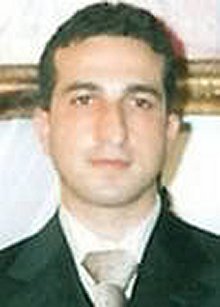 Iranian pastor Yousef Nadarkhani has twice refused to recant his Christian faith during two court hearings held in Rasht, Gilan Province on 25 and 26 September. Sources close to CSW indicate that recanting will again be demanded at sessions scheduled for 27 and 28 September, and that if he continues to refuse, he will be executed thereafter.
Iranian pastor Yousef Nadarkhani has twice refused to recant his Christian faith during two court hearings held in Rasht, Gilan Province on 25 and 26 September. Sources close to CSW indicate that recanting will again be demanded at sessions scheduled for 27 and 28 September, and that if he continues to refuse, he will be executed thereafter.
Pastor Nadarkhani was tried and found guilty of apostasy (abandoning Islam) in September 2010 by the court of appeals in Rasht. The verdict was delivered verbally in court, while written confirmation of the death sentence was received nearly two months later. At the appeal in June 2011, the Supreme Court of Iran upheld Pastor Youcef Nadarkhani's sentence, but asked the court in Rasht, which issued the initial sentence, to re-examine whether or not he had been a practicing Muslim adult prior to converting to Christianity. The written verdict of the Supreme Court's decision included provision for annulment of the death sentence if Pastor Nadarkhani recanted his faith.
Following investigation, the court in Rasht has ruled that Pastor Nadarkhani was not a practicing Muslim adult before becoming a Christian. However, the court has decided that he remains guilty of apostasy because he has Muslim ancestry. Pastor Nadarkhani's lawyer, Mr Mohammed Ali Dadkhah, has made it clear to the court that the repeated demand for recanting is against both Iranian law and the constitution. The court replied that the verdict of the Supreme Court must be applied, regardless of the illegality of the demand.
The death sentence for apostasy is not codified in the Iranian Penal Code. However, using a loophole in Iran's constitution, the judges in Rasht based their original verdict on fatwas by Ayatollahs Khomeini, the "father" of Iran's revolution in 1979, Khamenei, the Supreme Leader of Iran, and of Makarem Shirazi, currently the most influential religious leader in Iran.
Pastor Yousef Nadarkhani, of the Church of Iran denomination, was arrested in his home city of Rasht on 13 October 2009 while attempting to register his church. His arrest is believed to have been due to his questioning of the Muslim monopoly on the religious instruction of children in Iran. He was initially charged with protesting; however the charges against him were later changed to apostasy and evangelising Muslims. His lawyer, Mr Mohammed Ali Dadkhah, a prominent Iranian human rights defender, is also facing legal difficulties. On Sunday 3 July a court in Tehran sentenced Mr Dadkhah to nine years in jail and a 10-year ban on practicing law or teaching at university for "actions and propaganda against the Islamic regime". He is currently appealing the sentence.
CSW's Special Ambassador Stuart Windsor said, "CSW is calling on key members of the international community to urgently raise Pastor Nadarkhani's case with the Iranian authorities. His life depends on it, and we have grave concerns regarding due process in this case, and also in that of his lawyer, Mr Dadkhah. The verdict handed down to Pastor Nadarkhani is in violation of the international covenants to which Iran is a signatory, including the International Covenant on Civil and Political Rights (ICPPR), which guarantees freedom of religion and freedom to change one's religion. It also violates article 23 of the Iranian Constitution, which states that no-one should be molested or taken to task simply for holding a certain belief."
Time is of the essence. Please take action today.
CSW is calling for urgent prayer and action on behalf of Pastor Nadarkhani today. Please email the Iranian embassy as soon as you can, urging them not to go ahead with the execution following the trial.
Notes to Editors:
1. The use of fatwas as a basis for the verdict on Nadarkhani is provided for under Article 167 of the Iranian Constitution, which states that while judges have a duty to find a basis for their rulings within the legal code, "if such a basis doesn't exist, they must cite reliable Islamic sources or a valid fatwa from which they have drawn a judgment in order to issue a verdict. Judges may not refuse to hear cases or issue rulings only because the case before them is not covered in the legal code, or there may be shortcomings or conflicts in the law."
2. Mohammed Ali Dadhkah is a founding member of the Defenders of Human Rights Centre, an Iranian organisation, along with Nobel Prize winner Shirin Ebadi.
 Iranian pastor Yousef Nadarkhani has twice refused to recant his Christian faith during two court hearings held in Rasht, Gilan Province on 25 and 26 September. Sources close to CSW indicate that recanting will again be demanded at sessions scheduled for 27 and 28 September, and that if he continues to refuse, he will be executed thereafter.
Iranian pastor Yousef Nadarkhani has twice refused to recant his Christian faith during two court hearings held in Rasht, Gilan Province on 25 and 26 September. Sources close to CSW indicate that recanting will again be demanded at sessions scheduled for 27 and 28 September, and that if he continues to refuse, he will be executed thereafter.